European Union Law: HRA, Direct Effect, and Court Jurisdiction
VerifiedAdded on 2021/05/27
|7
|1713
|19
Homework Assignment
AI Summary
This assignment delves into key principles of European Union Law, analyzing the Human Rights Act (HRA) and its implications on parliamentary sovereignty and the interpretation of legislation. It examines the principle of direct effect, detailing how individuals can enforce EU law in national courts and its limitations. The assignment presents two case studies: one involving food poisoning and potential theft, analyzing liability under the Theft Act 1969 and the application of civil law; the other explores court jurisdiction, particularly the role of county courts in civil matters, the hierarchy of courts, and the distinction between civil and criminal cases. The solution outlines the legal framework, the issues presented, and the application of relevant laws, including an analysis of liability and the burden of proof. It also addresses the planning process, problems encountered, and provides a bibliography of legal resources.
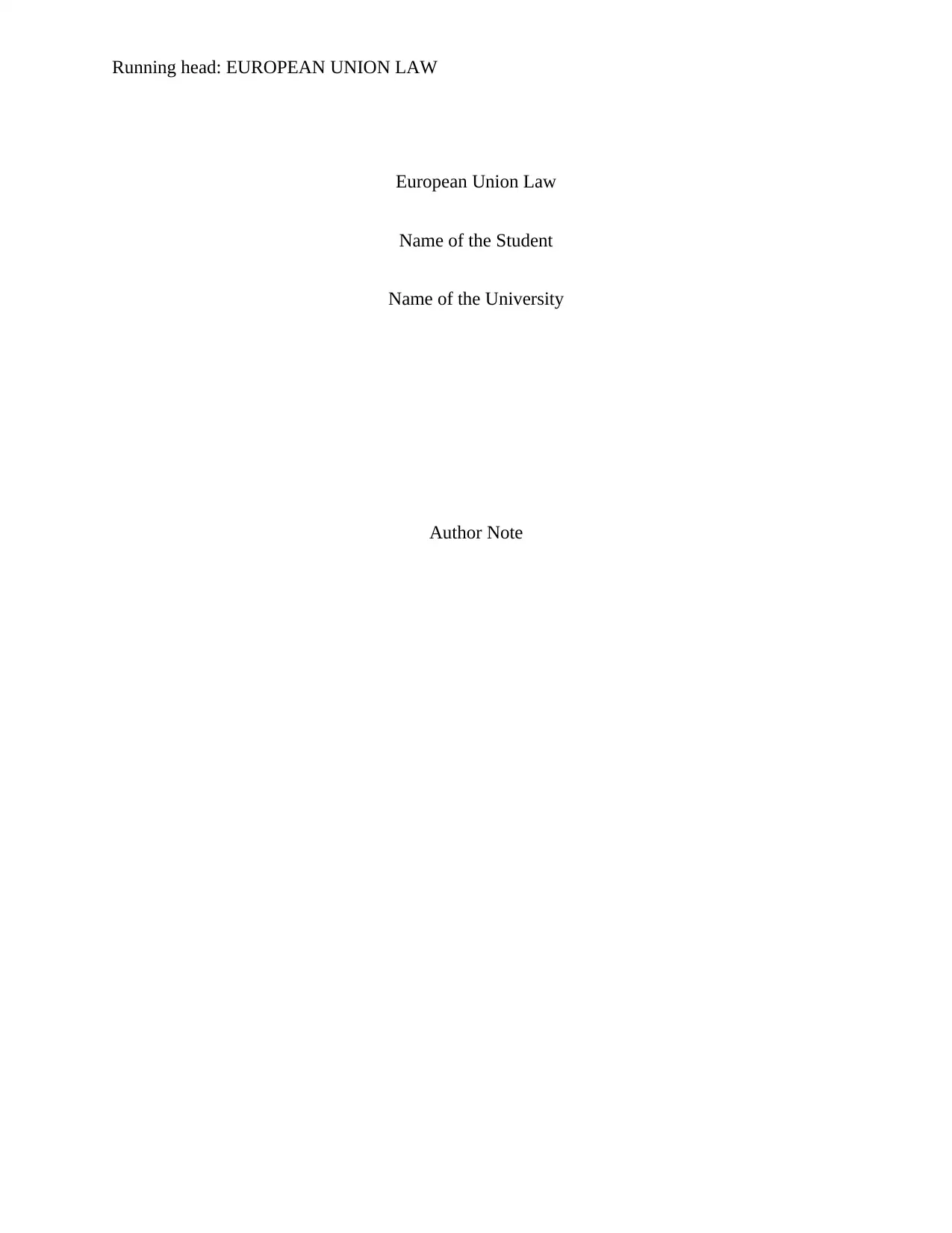
Running head: EUROPEAN UNION LAW
European Union Law
Name of the Student
Name of the University
Author Note
European Union Law
Name of the Student
Name of the University
Author Note
Paraphrase This Document
Need a fresh take? Get an instant paraphrase of this document with our AI Paraphraser
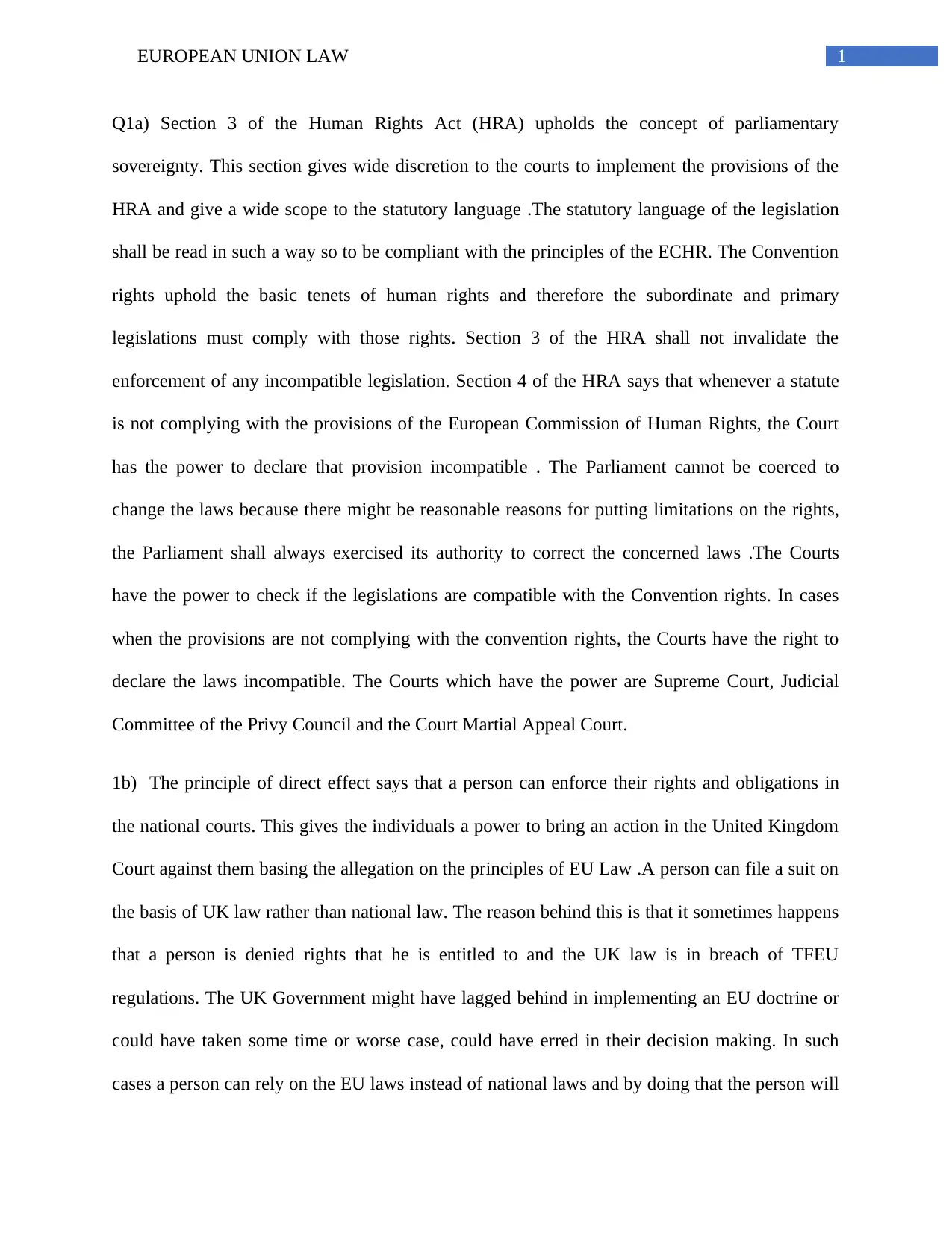
1EUROPEAN UNION LAW
Q1a) Section 3 of the Human Rights Act (HRA) upholds the concept of parliamentary
sovereignty. This section gives wide discretion to the courts to implement the provisions of the
HRA and give a wide scope to the statutory language .The statutory language of the legislation
shall be read in such a way so to be compliant with the principles of the ECHR. The Convention
rights uphold the basic tenets of human rights and therefore the subordinate and primary
legislations must comply with those rights. Section 3 of the HRA shall not invalidate the
enforcement of any incompatible legislation. Section 4 of the HRA says that whenever a statute
is not complying with the provisions of the European Commission of Human Rights, the Court
has the power to declare that provision incompatible . The Parliament cannot be coerced to
change the laws because there might be reasonable reasons for putting limitations on the rights,
the Parliament shall always exercised its authority to correct the concerned laws .The Courts
have the power to check if the legislations are compatible with the Convention rights. In cases
when the provisions are not complying with the convention rights, the Courts have the right to
declare the laws incompatible. The Courts which have the power are Supreme Court, Judicial
Committee of the Privy Council and the Court Martial Appeal Court.
1b) The principle of direct effect says that a person can enforce their rights and obligations in
the national courts. This gives the individuals a power to bring an action in the United Kingdom
Court against them basing the allegation on the principles of EU Law .A person can file a suit on
the basis of UK law rather than national law. The reason behind this is that it sometimes happens
that a person is denied rights that he is entitled to and the UK law is in breach of TFEU
regulations. The UK Government might have lagged behind in implementing an EU doctrine or
could have taken some time or worse case, could have erred in their decision making. In such
cases a person can rely on the EU laws instead of national laws and by doing that the person will
Q1a) Section 3 of the Human Rights Act (HRA) upholds the concept of parliamentary
sovereignty. This section gives wide discretion to the courts to implement the provisions of the
HRA and give a wide scope to the statutory language .The statutory language of the legislation
shall be read in such a way so to be compliant with the principles of the ECHR. The Convention
rights uphold the basic tenets of human rights and therefore the subordinate and primary
legislations must comply with those rights. Section 3 of the HRA shall not invalidate the
enforcement of any incompatible legislation. Section 4 of the HRA says that whenever a statute
is not complying with the provisions of the European Commission of Human Rights, the Court
has the power to declare that provision incompatible . The Parliament cannot be coerced to
change the laws because there might be reasonable reasons for putting limitations on the rights,
the Parliament shall always exercised its authority to correct the concerned laws .The Courts
have the power to check if the legislations are compatible with the Convention rights. In cases
when the provisions are not complying with the convention rights, the Courts have the right to
declare the laws incompatible. The Courts which have the power are Supreme Court, Judicial
Committee of the Privy Council and the Court Martial Appeal Court.
1b) The principle of direct effect says that a person can enforce their rights and obligations in
the national courts. This gives the individuals a power to bring an action in the United Kingdom
Court against them basing the allegation on the principles of EU Law .A person can file a suit on
the basis of UK law rather than national law. The reason behind this is that it sometimes happens
that a person is denied rights that he is entitled to and the UK law is in breach of TFEU
regulations. The UK Government might have lagged behind in implementing an EU doctrine or
could have taken some time or worse case, could have erred in their decision making. In such
cases a person can rely on the EU laws instead of national laws and by doing that the person will
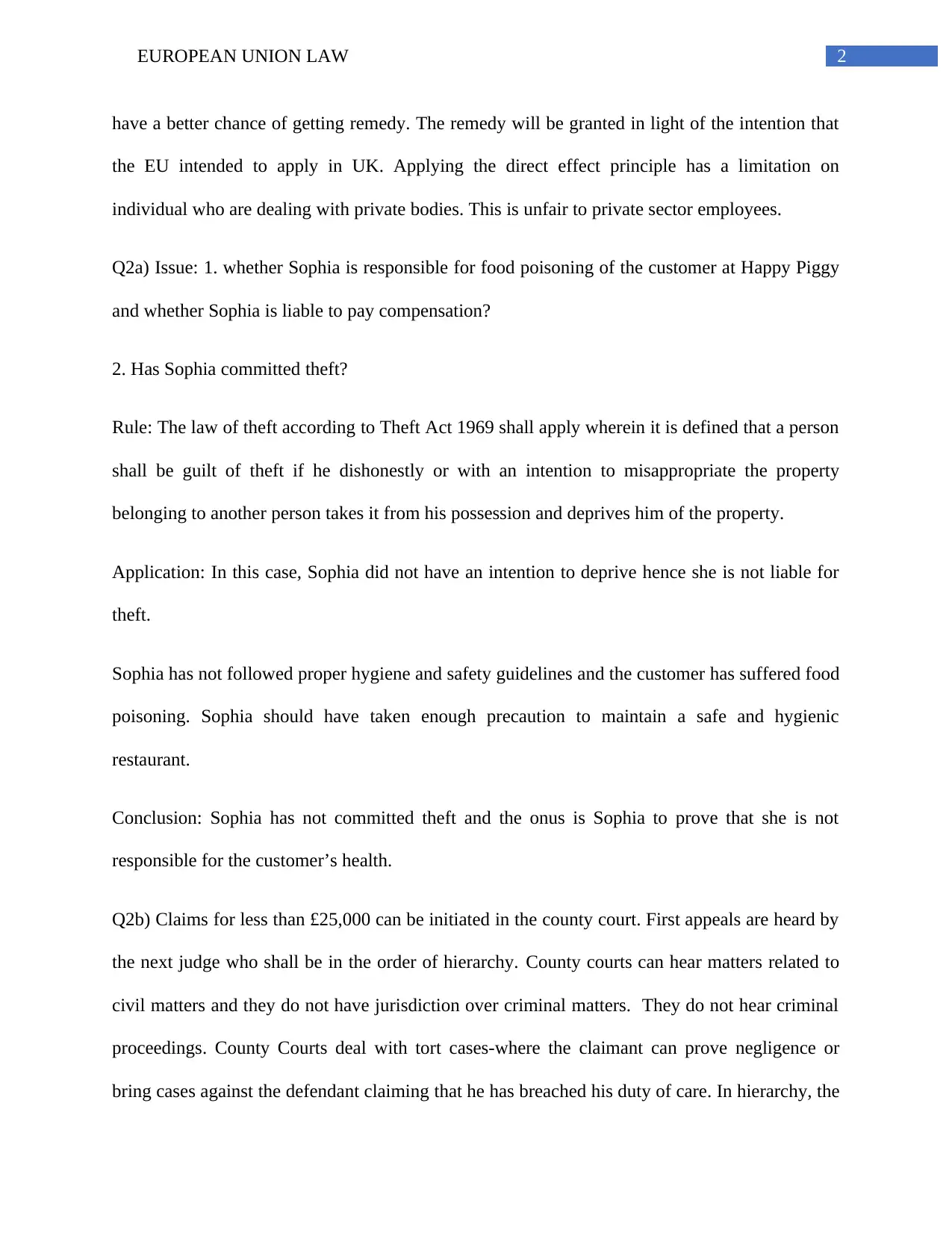
2EUROPEAN UNION LAW
have a better chance of getting remedy. The remedy will be granted in light of the intention that
the EU intended to apply in UK. Applying the direct effect principle has a limitation on
individual who are dealing with private bodies. This is unfair to private sector employees.
Q2a) Issue: 1. whether Sophia is responsible for food poisoning of the customer at Happy Piggy
and whether Sophia is liable to pay compensation?
2. Has Sophia committed theft?
Rule: The law of theft according to Theft Act 1969 shall apply wherein it is defined that a person
shall be guilt of theft if he dishonestly or with an intention to misappropriate the property
belonging to another person takes it from his possession and deprives him of the property.
Application: In this case, Sophia did not have an intention to deprive hence she is not liable for
theft.
Sophia has not followed proper hygiene and safety guidelines and the customer has suffered food
poisoning. Sophia should have taken enough precaution to maintain a safe and hygienic
restaurant.
Conclusion: Sophia has not committed theft and the onus is Sophia to prove that she is not
responsible for the customer’s health.
Q2b) Claims for less than £25,000 can be initiated in the county court. First appeals are heard by
the next judge who shall be in the order of hierarchy. County courts can hear matters related to
civil matters and they do not have jurisdiction over criminal matters. They do not hear criminal
proceedings. County Courts deal with tort cases-where the claimant can prove negligence or
bring cases against the defendant claiming that he has breached his duty of care. In hierarchy, the
have a better chance of getting remedy. The remedy will be granted in light of the intention that
the EU intended to apply in UK. Applying the direct effect principle has a limitation on
individual who are dealing with private bodies. This is unfair to private sector employees.
Q2a) Issue: 1. whether Sophia is responsible for food poisoning of the customer at Happy Piggy
and whether Sophia is liable to pay compensation?
2. Has Sophia committed theft?
Rule: The law of theft according to Theft Act 1969 shall apply wherein it is defined that a person
shall be guilt of theft if he dishonestly or with an intention to misappropriate the property
belonging to another person takes it from his possession and deprives him of the property.
Application: In this case, Sophia did not have an intention to deprive hence she is not liable for
theft.
Sophia has not followed proper hygiene and safety guidelines and the customer has suffered food
poisoning. Sophia should have taken enough precaution to maintain a safe and hygienic
restaurant.
Conclusion: Sophia has not committed theft and the onus is Sophia to prove that she is not
responsible for the customer’s health.
Q2b) Claims for less than £25,000 can be initiated in the county court. First appeals are heard by
the next judge who shall be in the order of hierarchy. County courts can hear matters related to
civil matters and they do not have jurisdiction over criminal matters. They do not hear criminal
proceedings. County Courts deal with tort cases-where the claimant can prove negligence or
bring cases against the defendant claiming that he has breached his duty of care. In hierarchy, the
⊘ This is a preview!⊘
Do you want full access?
Subscribe today to unlock all pages.

Trusted by 1+ million students worldwide
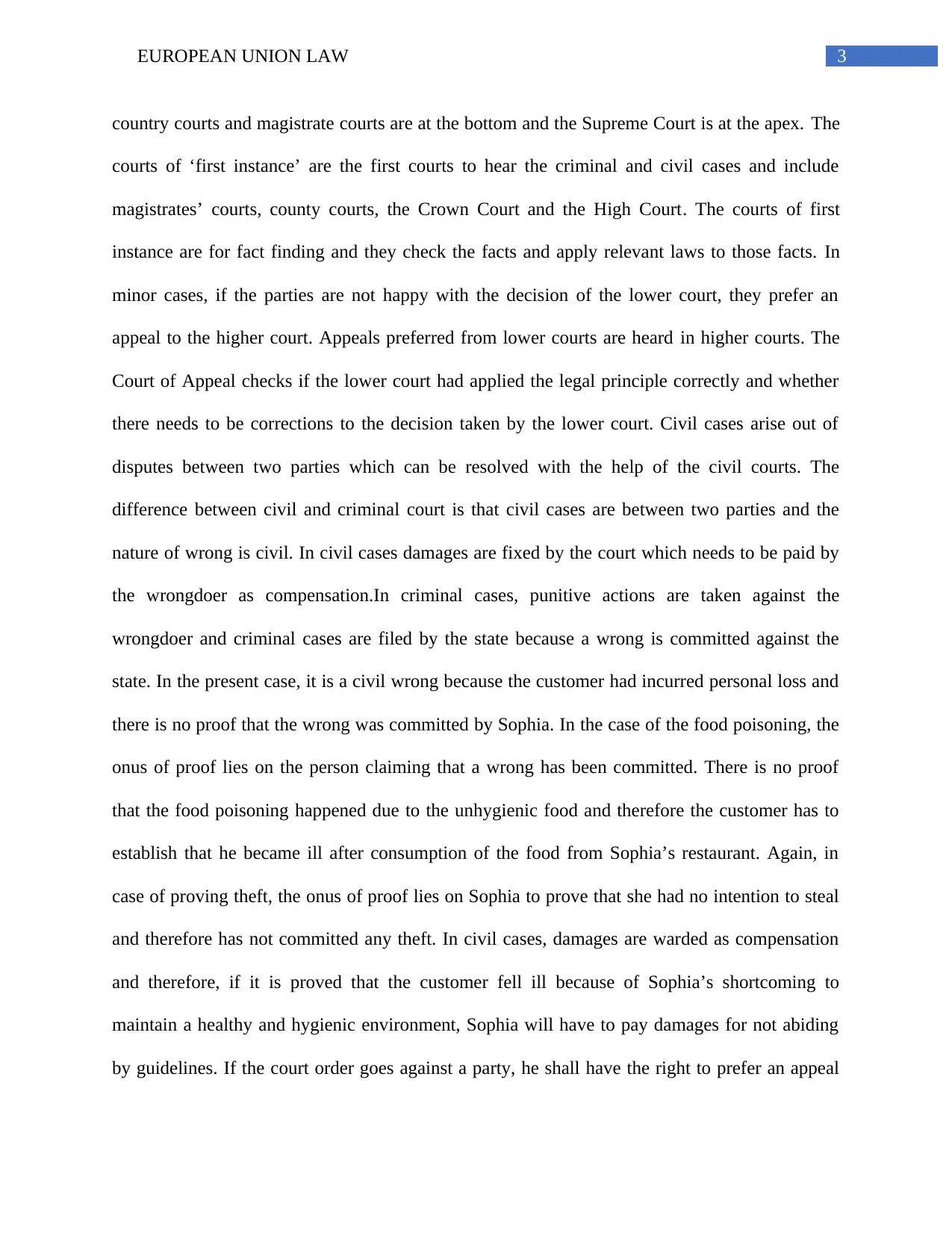
3EUROPEAN UNION LAW
country courts and magistrate courts are at the bottom and the Supreme Court is at the apex. The
courts of ‘first instance’ are the first courts to hear the criminal and civil cases and include
magistrates’ courts, county courts, the Crown Court and the High Court. The courts of first
instance are for fact finding and they check the facts and apply relevant laws to those facts. In
minor cases, if the parties are not happy with the decision of the lower court, they prefer an
appeal to the higher court. Appeals preferred from lower courts are heard in higher courts. The
Court of Appeal checks if the lower court had applied the legal principle correctly and whether
there needs to be corrections to the decision taken by the lower court. Civil cases arise out of
disputes between two parties which can be resolved with the help of the civil courts. The
difference between civil and criminal court is that civil cases are between two parties and the
nature of wrong is civil. In civil cases damages are fixed by the court which needs to be paid by
the wrongdoer as compensation.In criminal cases, punitive actions are taken against the
wrongdoer and criminal cases are filed by the state because a wrong is committed against the
state. In the present case, it is a civil wrong because the customer had incurred personal loss and
there is no proof that the wrong was committed by Sophia. In the case of the food poisoning, the
onus of proof lies on the person claiming that a wrong has been committed. There is no proof
that the food poisoning happened due to the unhygienic food and therefore the customer has to
establish that he became ill after consumption of the food from Sophia’s restaurant. Again, in
case of proving theft, the onus of proof lies on Sophia to prove that she had no intention to steal
and therefore has not committed any theft. In civil cases, damages are warded as compensation
and therefore, if it is proved that the customer fell ill because of Sophia’s shortcoming to
maintain a healthy and hygienic environment, Sophia will have to pay damages for not abiding
by guidelines. If the court order goes against a party, he shall have the right to prefer an appeal
country courts and magistrate courts are at the bottom and the Supreme Court is at the apex. The
courts of ‘first instance’ are the first courts to hear the criminal and civil cases and include
magistrates’ courts, county courts, the Crown Court and the High Court. The courts of first
instance are for fact finding and they check the facts and apply relevant laws to those facts. In
minor cases, if the parties are not happy with the decision of the lower court, they prefer an
appeal to the higher court. Appeals preferred from lower courts are heard in higher courts. The
Court of Appeal checks if the lower court had applied the legal principle correctly and whether
there needs to be corrections to the decision taken by the lower court. Civil cases arise out of
disputes between two parties which can be resolved with the help of the civil courts. The
difference between civil and criminal court is that civil cases are between two parties and the
nature of wrong is civil. In civil cases damages are fixed by the court which needs to be paid by
the wrongdoer as compensation.In criminal cases, punitive actions are taken against the
wrongdoer and criminal cases are filed by the state because a wrong is committed against the
state. In the present case, it is a civil wrong because the customer had incurred personal loss and
there is no proof that the wrong was committed by Sophia. In the case of the food poisoning, the
onus of proof lies on the person claiming that a wrong has been committed. There is no proof
that the food poisoning happened due to the unhygienic food and therefore the customer has to
establish that he became ill after consumption of the food from Sophia’s restaurant. Again, in
case of proving theft, the onus of proof lies on Sophia to prove that she had no intention to steal
and therefore has not committed any theft. In civil cases, damages are warded as compensation
and therefore, if it is proved that the customer fell ill because of Sophia’s shortcoming to
maintain a healthy and hygienic environment, Sophia will have to pay damages for not abiding
by guidelines. If the court order goes against a party, he shall have the right to prefer an appeal
Paraphrase This Document
Need a fresh take? Get an instant paraphrase of this document with our AI Paraphraser
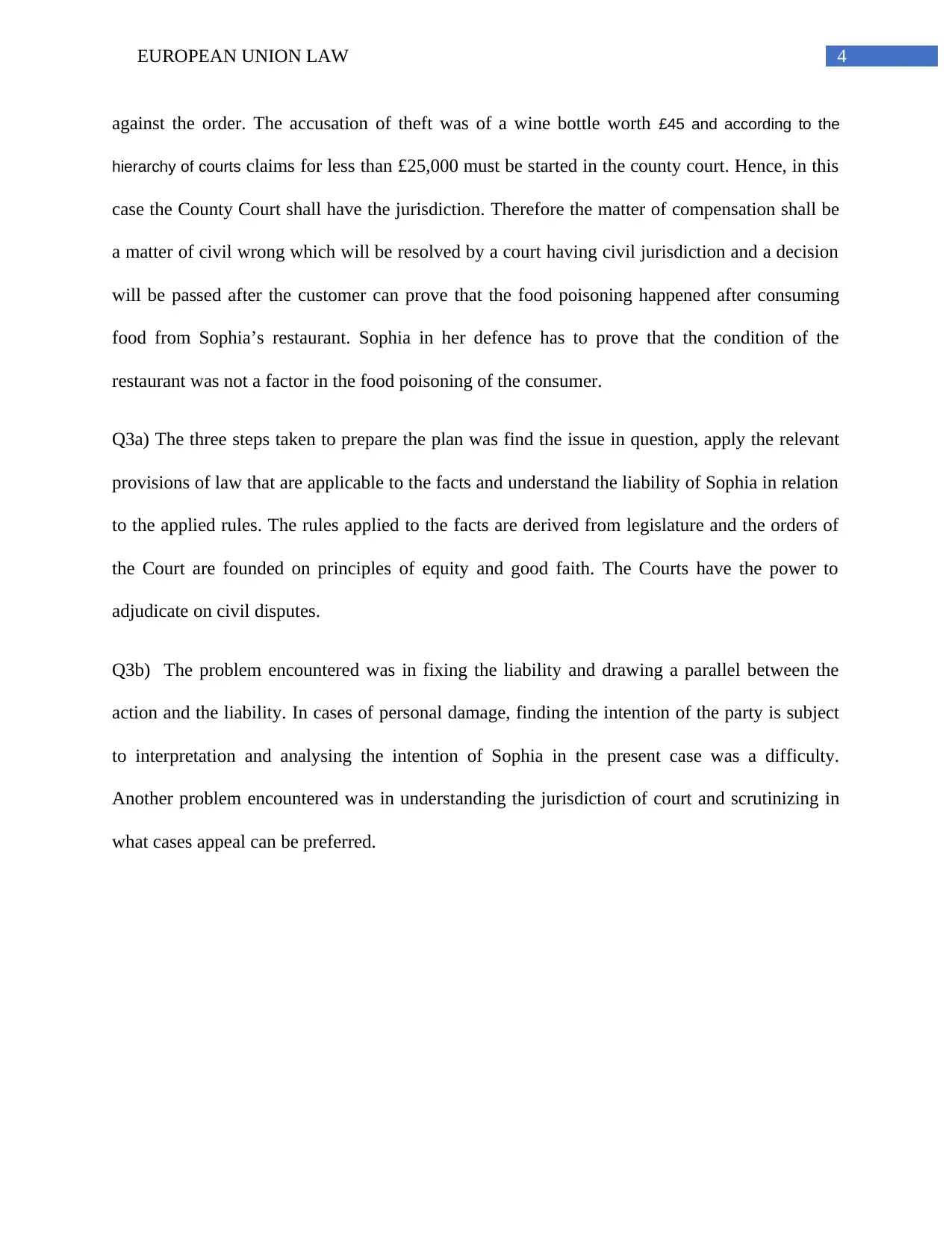
4EUROPEAN UNION LAW
against the order. The accusation of theft was of a wine bottle worth £45 and according to the
hierarchy of courts claims for less than £25,000 must be started in the county court. Hence, in this
case the County Court shall have the jurisdiction. Therefore the matter of compensation shall be
a matter of civil wrong which will be resolved by a court having civil jurisdiction and a decision
will be passed after the customer can prove that the food poisoning happened after consuming
food from Sophia’s restaurant. Sophia in her defence has to prove that the condition of the
restaurant was not a factor in the food poisoning of the consumer.
Q3a) The three steps taken to prepare the plan was find the issue in question, apply the relevant
provisions of law that are applicable to the facts and understand the liability of Sophia in relation
to the applied rules. The rules applied to the facts are derived from legislature and the orders of
the Court are founded on principles of equity and good faith. The Courts have the power to
adjudicate on civil disputes.
Q3b) The problem encountered was in fixing the liability and drawing a parallel between the
action and the liability. In cases of personal damage, finding the intention of the party is subject
to interpretation and analysing the intention of Sophia in the present case was a difficulty.
Another problem encountered was in understanding the jurisdiction of court and scrutinizing in
what cases appeal can be preferred.
against the order. The accusation of theft was of a wine bottle worth £45 and according to the
hierarchy of courts claims for less than £25,000 must be started in the county court. Hence, in this
case the County Court shall have the jurisdiction. Therefore the matter of compensation shall be
a matter of civil wrong which will be resolved by a court having civil jurisdiction and a decision
will be passed after the customer can prove that the food poisoning happened after consuming
food from Sophia’s restaurant. Sophia in her defence has to prove that the condition of the
restaurant was not a factor in the food poisoning of the consumer.
Q3a) The three steps taken to prepare the plan was find the issue in question, apply the relevant
provisions of law that are applicable to the facts and understand the liability of Sophia in relation
to the applied rules. The rules applied to the facts are derived from legislature and the orders of
the Court are founded on principles of equity and good faith. The Courts have the power to
adjudicate on civil disputes.
Q3b) The problem encountered was in fixing the liability and drawing a parallel between the
action and the liability. In cases of personal damage, finding the intention of the party is subject
to interpretation and analysing the intention of Sophia in the present case was a difficulty.
Another problem encountered was in understanding the jurisdiction of court and scrutinizing in
what cases appeal can be preferred.
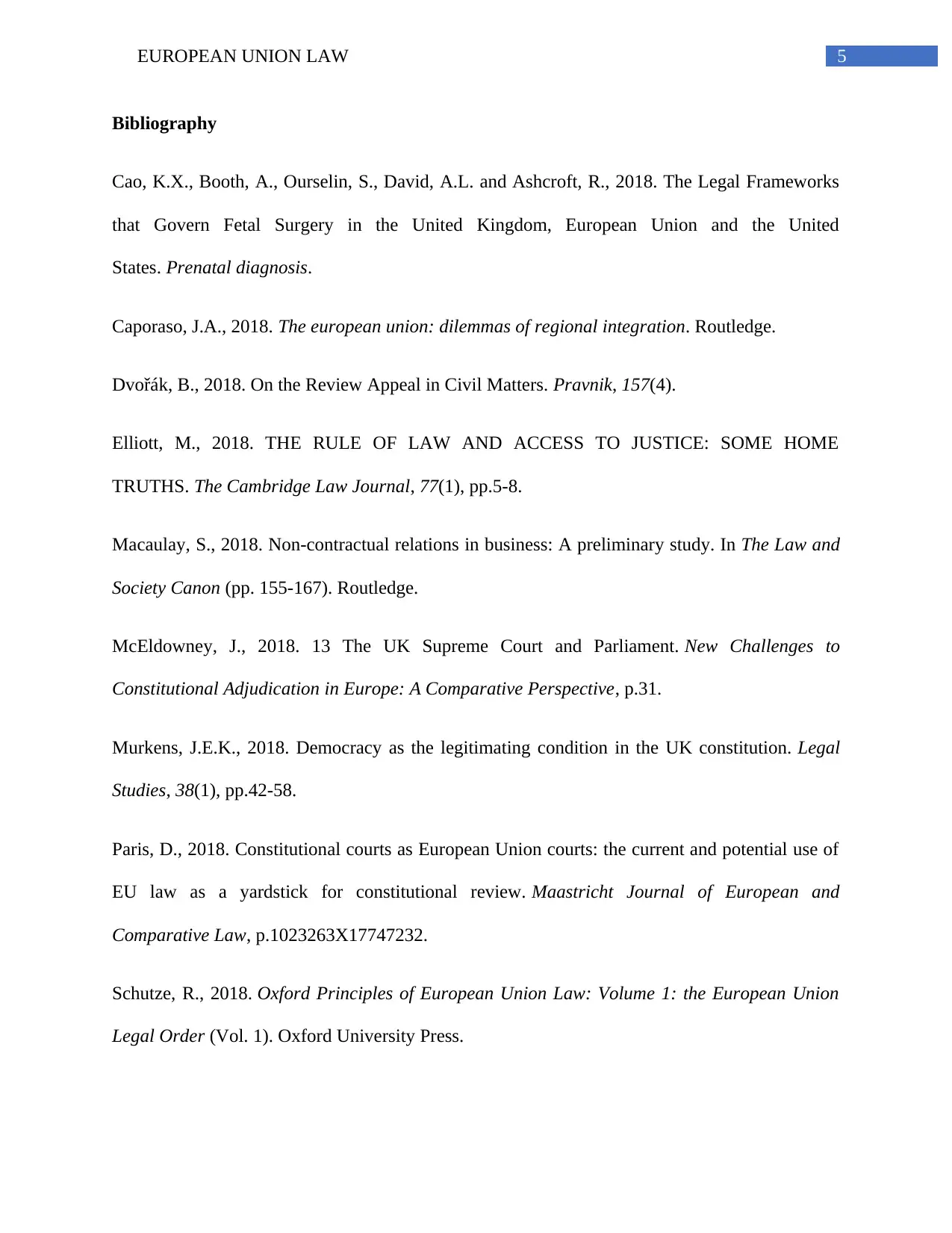
5EUROPEAN UNION LAW
Bibliography
Cao, K.X., Booth, A., Ourselin, S., David, A.L. and Ashcroft, R., 2018. The Legal Frameworks
that Govern Fetal Surgery in the United Kingdom, European Union and the United
States. Prenatal diagnosis.
Caporaso, J.A., 2018. The european union: dilemmas of regional integration. Routledge.
Dvořák, B., 2018. On the Review Appeal in Civil Matters. Pravnik, 157(4).
Elliott, M., 2018. THE RULE OF LAW AND ACCESS TO JUSTICE: SOME HOME
TRUTHS. The Cambridge Law Journal, 77(1), pp.5-8.
Macaulay, S., 2018. Non-contractual relations in business: A preliminary study. In The Law and
Society Canon (pp. 155-167). Routledge.
McEldowney, J., 2018. 13 The UK Supreme Court and Parliament. New Challenges to
Constitutional Adjudication in Europe: A Comparative Perspective, p.31.
Murkens, J.E.K., 2018. Democracy as the legitimating condition in the UK constitution. Legal
Studies, 38(1), pp.42-58.
Paris, D., 2018. Constitutional courts as European Union courts: the current and potential use of
EU law as a yardstick for constitutional review. Maastricht Journal of European and
Comparative Law, p.1023263X17747232.
Schutze, R., 2018. Oxford Principles of European Union Law: Volume 1: the European Union
Legal Order (Vol. 1). Oxford University Press.
Bibliography
Cao, K.X., Booth, A., Ourselin, S., David, A.L. and Ashcroft, R., 2018. The Legal Frameworks
that Govern Fetal Surgery in the United Kingdom, European Union and the United
States. Prenatal diagnosis.
Caporaso, J.A., 2018. The european union: dilemmas of regional integration. Routledge.
Dvořák, B., 2018. On the Review Appeal in Civil Matters. Pravnik, 157(4).
Elliott, M., 2018. THE RULE OF LAW AND ACCESS TO JUSTICE: SOME HOME
TRUTHS. The Cambridge Law Journal, 77(1), pp.5-8.
Macaulay, S., 2018. Non-contractual relations in business: A preliminary study. In The Law and
Society Canon (pp. 155-167). Routledge.
McEldowney, J., 2018. 13 The UK Supreme Court and Parliament. New Challenges to
Constitutional Adjudication in Europe: A Comparative Perspective, p.31.
Murkens, J.E.K., 2018. Democracy as the legitimating condition in the UK constitution. Legal
Studies, 38(1), pp.42-58.
Paris, D., 2018. Constitutional courts as European Union courts: the current and potential use of
EU law as a yardstick for constitutional review. Maastricht Journal of European and
Comparative Law, p.1023263X17747232.
Schutze, R., 2018. Oxford Principles of European Union Law: Volume 1: the European Union
Legal Order (Vol. 1). Oxford University Press.
⊘ This is a preview!⊘
Do you want full access?
Subscribe today to unlock all pages.

Trusted by 1+ million students worldwide
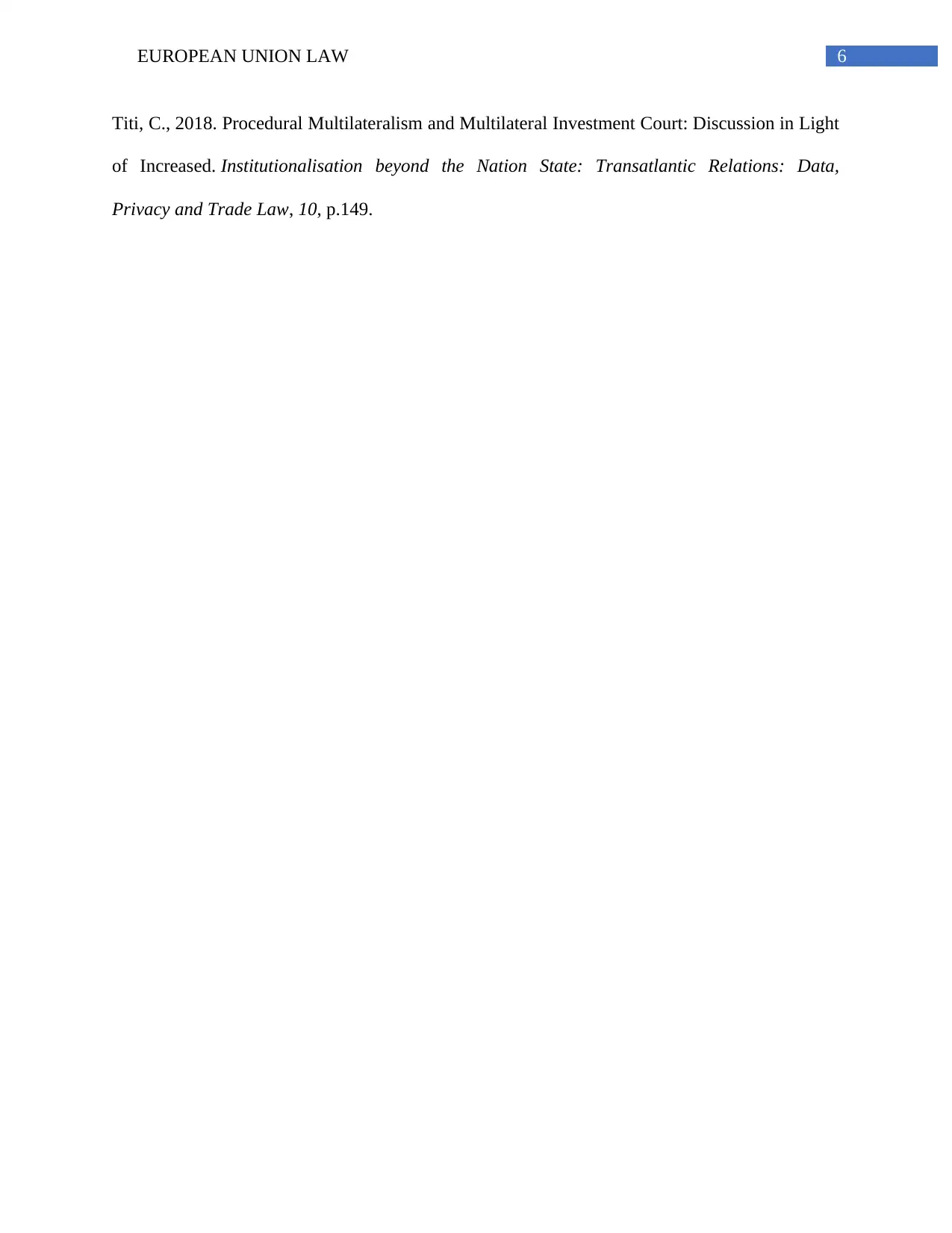
6EUROPEAN UNION LAW
Titi, C., 2018. Procedural Multilateralism and Multilateral Investment Court: Discussion in Light
of Increased. Institutionalisation beyond the Nation State: Transatlantic Relations: Data,
Privacy and Trade Law, 10, p.149.
Titi, C., 2018. Procedural Multilateralism and Multilateral Investment Court: Discussion in Light
of Increased. Institutionalisation beyond the Nation State: Transatlantic Relations: Data,
Privacy and Trade Law, 10, p.149.
1 out of 7
Related Documents
Your All-in-One AI-Powered Toolkit for Academic Success.
+13062052269
info@desklib.com
Available 24*7 on WhatsApp / Email
![[object Object]](/_next/static/media/star-bottom.7253800d.svg)
Unlock your academic potential
Copyright © 2020–2026 A2Z Services. All Rights Reserved. Developed and managed by ZUCOL.





